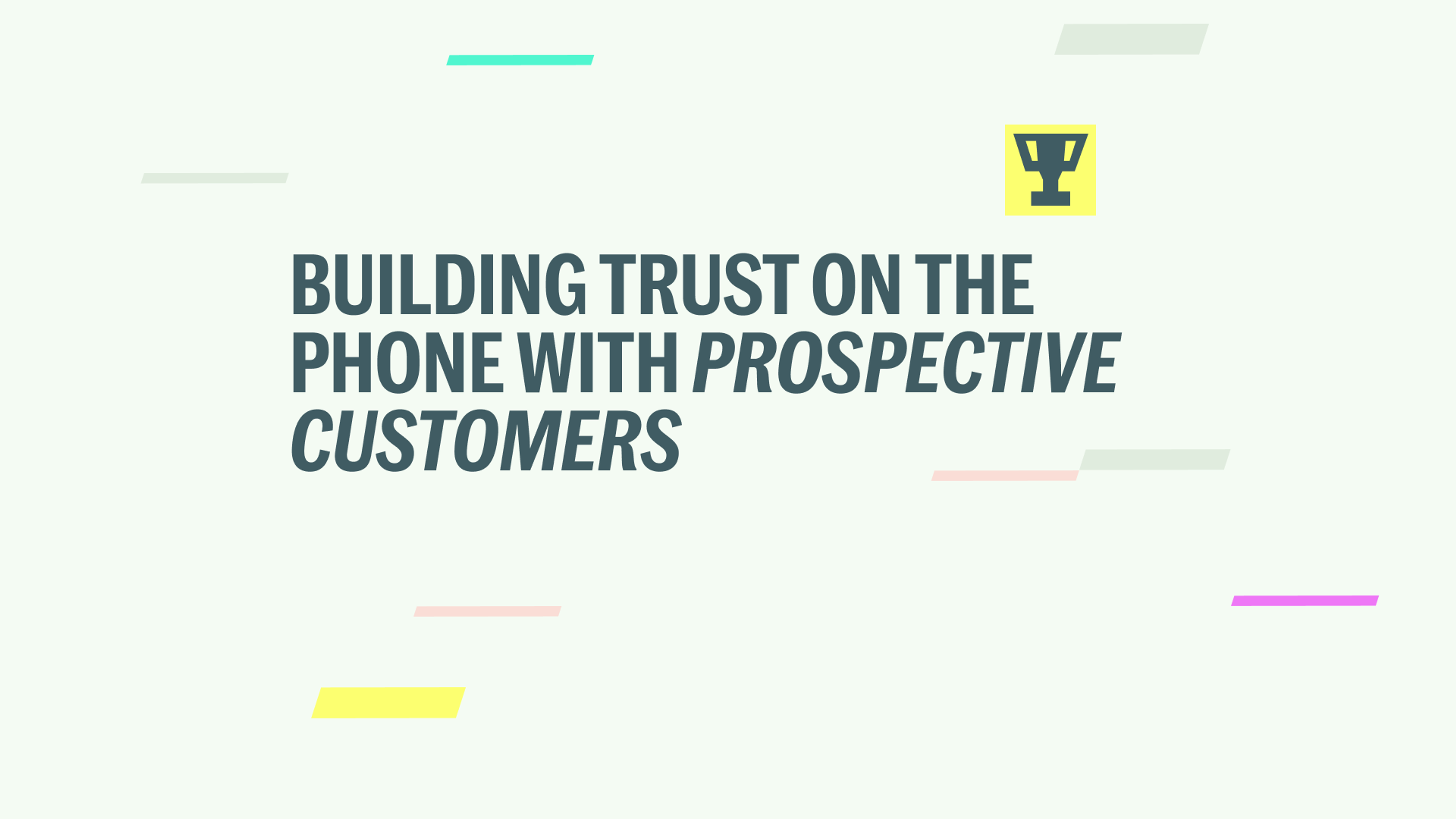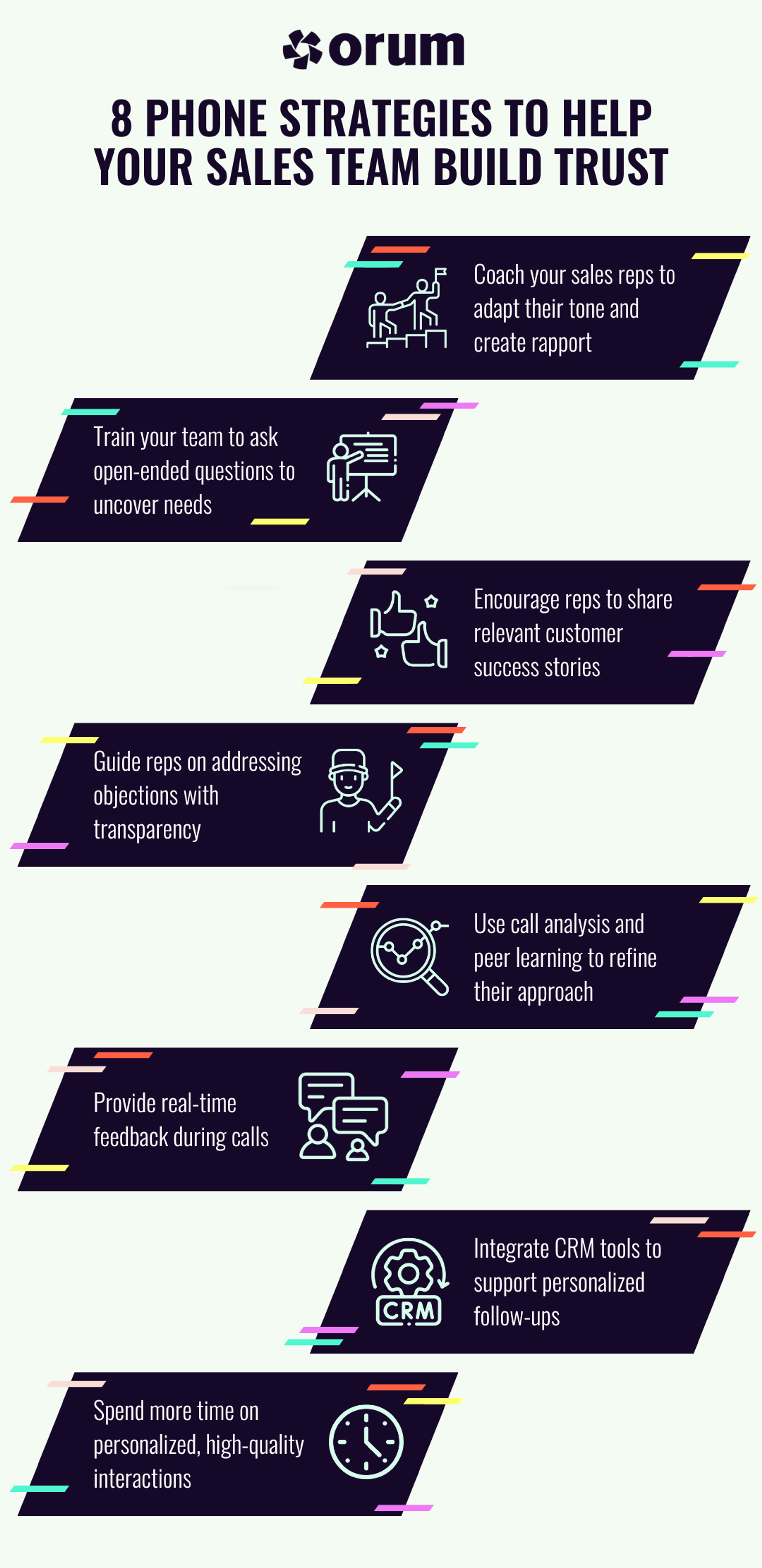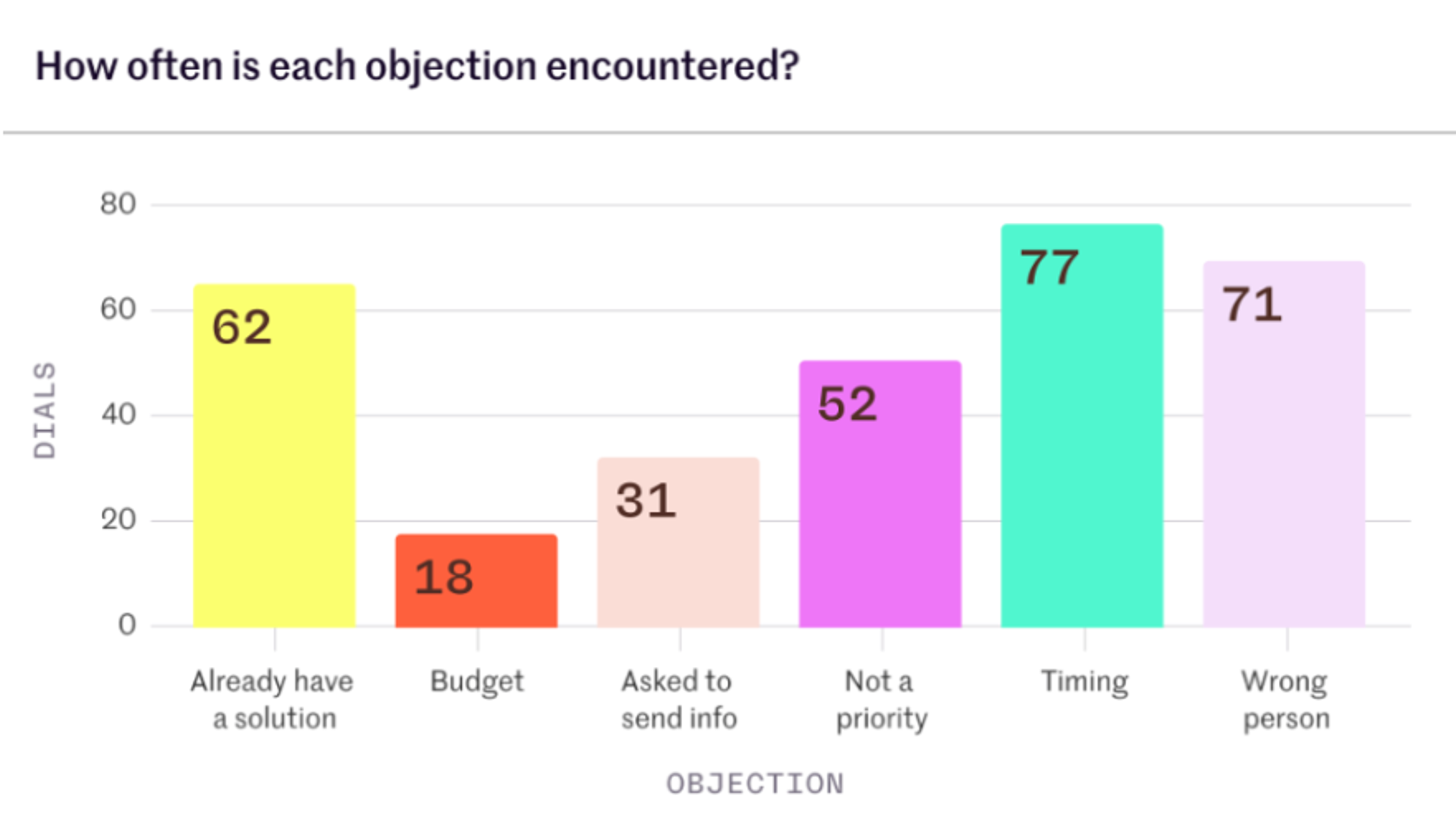How to Build Trust in Sales: 8 Phone Techniques & Tools


Research shows only 30% of consumers report having high trust in companies*. Meanwhile, 70% of sales teams say over half their pipeline is generated through phone calls**.
So, your people face an uphill struggle: They’re limited by what they can communicate and the time they have to do it—and the consumer on the other end of the line probably doesn’t believe them.
Establishing trust as you nurture leads and close deals is, therefore, an essential factor in your ability to hit targets.
This is why you need to employ multiple strategies to support and drive the sales process—both in and out of calls. These include researching your target audience, using psychological techniques, coaching, and integrating analytics software.
In this article, we explain why trust is imperative in the sales process, psychological principles for building trust, and eight techniques that facilitate trust-building over phone calls.
Help your sales team build trust with prospects
Use Orum to gain detailed insights into each team member’s call performance and offer personalized training to increase their trust-building skills.
Request a demo
Understanding the importance of trust in sales
Nobody ever wants to be “sold” anything, especially busy decision-makers who are likely already flooded with pitches and follow-ups. The ability to establish trust in your customer relationships is what sets you apart and opens the door to real client connections.
Why trust is essential in sales
If a prospect doesn’t trust you, they are extraordinarily unlikely to buy from you—even if your product or service is phenomenal.
One study found that 88% of decision-makers only purchase when they see the salesperson as a trusted advisor who is there to answer their questions and make product recommendations based on their actual needs.
So what makes a trusted advisor? It’s someone who helps customers make informed purchasing decisions by prioritizing factors like usage needs, budget, and desired features.
Customers are more likely to trust your guidance when they feel you genuinely understand their needs and are focused on finding the right solution.
Common barriers to building trust over the phone
Phone calls are an effective way to generate pipeline, but that means no body language—so no friendly smile or warm handshake to help set people at ease.
This makes it difficult for your team to express themselves and makes it hard to gauge how prospects feel as the call proceeds, making it even more challenging to establish rapport or adapt mid-conversation as needed.
There also may be the pressure to close quickly, resulting in rushed conversations that can feel transactional.
This can be frustrating for both the potential customer, who feels undervalued, and your sales rep, who wants to offer more personalized support.
Handling objections over the phone can be particularly challenging. Objections may range from simple brush-offs to resistance due to the customer’s limited bandwidth.
Managing these effectively without being able to read the customer’s emotions presents several difficulties:
- Understanding the underlying reasons behind objections can be challenging.
- Prospects may quickly begin to feel impatient and stressed.
- Conversations can feel transactional, and overcoming objections too aggressively can erode trust.
- Potential distractions can make it difficult for the prospect or the salesperson to focus their attention on the call.
As a result, your sales teams can benefit from a comprehensive solution that provides access to peer call recordings, sentiment analysis, analytics, and real-time feedback. This will allow you to refine selling techniques and improve key metrics proactively.
Psychological principles for building trust in sales calls
Multiple factors influence whether or not we trust someone, and understanding them can help sales teams build strong relationships with potential customers. Incorporate the following psychological principles into your sales training to increase trust-building potential.
Reciprocity can foster mutual trust
Reciprocal conversations are balanced exchanges between you and the prospect. Sales reps shouldn’t rush through a script; they should use questions to understand the lead’s pain points better.
Creating a give-and-take dialogue establishes a foundation of mutual respect, encouraging prospects to share their real needs. Listen carefully to what prospects say and respond thoughtfully.
Social proof builds credibility
Social proof like reviews and endorsements can help sway customers and generate trust quickly by showing how you’ve made a difference in the past.
For example, suppose your LinkedIn profile has reviews mentioning your reliability and wins. In that case, prospects are more likely to feel comfortable engaging with you and intrigued by what you offer.
Social proof can ease doubts by showing prospects that others trust and benefit from your solutions.
Active listening and empathy build connections
Active listening is intentionally listening to the person you’re speaking to. It involves ignoring distractions, confirming that you understand what the other person is saying, and offering verbal clues and affirmations like “makes sense!”
Empathetic, active listening can help customers feel like you understand and care about their potential pain points and motivations, building trust.
Authority and expertise instill confidence
It’s easier to trust an expert that signals confidence in their knowledge of a topic—especially when it benefits the customer directly. Share your experience openly, and use it to explain how different solutions can address key issues.
And, if you don’t know the answer to a question about a product feature or pricing, it’s okay to say that, too. Let the customer know you’re unsure but you’ll be happy to find out—and tell them when they can expect to receive that information from you.
By demonstrating your honesty and openness, you can show you want to provide accurate information so the prospect can make an informed decision.
8 Phone strategies to help your sales reps build trust
To generate more pipeline and nurture buyers through the sales funnel, you can teach reps how to implement these eight phone strategies to build trust with even the most skeptical decision-makers reliably.

1. Coach your reps to adapt their tone to create rapport
Include trust-building techniques in your team’s sales coaching activities. This can start with showing reps how to adapt their tone during a conversation.
For example, they should look to match the client’s tone. When a client expresses frustration, respond with empathy rather than an upbeat approach to show you genuinely understand their challenges.
2. Train your team to ask open-ended questions to uncover needs
The best sales team members ask great questions, including open-ended ones that uncover critical information for stronger, more personalized recommendations.
Examples of open-ended questions for selling financial analytics software might include:
- "With your current tech stack, which software integrations would be most valuable to you with our platform?"
- "What timeline are you considering for integrating our software with your invoicing platform, and how quickly are you hoping to see results?"
- "When evaluating financial analytics platforms, which features are most important to you?"
- "What challenges or bottlenecks affect your ability to accurately forecast revenue or track performance metrics?"
3. Encourage reps to share relevant customer success stories
Equipping reps with specific, relatable success stories can strengthen trust and credibility.
Sharing snippets from case studies or customer testimonials in pitch decks—and adding personal anecdotes about helping clients with similar pain points—makes the interaction more genuine and relevant to the prospect.
When success stories directly address the prospect’s industry, challenges, or goals, they become powerful tools for illustrating value and reducing skepticism.
4. Guide reps on addressing objections with transparency
If a customer asks something you’re unsure about, let them know you’ll find the answer and follow up promptly.
Similarly, when addressing concerns, acknowledge their validity and provide clear, specific information to resolve them rather than dismissing them.
For example, if an insurance company considering your email marketing solution expresses concerns about data security while personalizing customer interactions, don’t just recommend data segmentation.
Instead, detail the specific safeguards, such as CRM data control options and robust security protocols, that ensure their customer information remains protected. This approach demonstrates your commitment to transparency and client needs.
5. Use call analysis and peer learning to help reps refine their approach
Direct feedback based on a sales rep’s performance will help them develop more client-centered communication techniques.
For example, some reps might rush through calls without allowing prospects time to explain their needs, missing key insights fully. Others may rely too heavily on scripted responses, making interactions feel impersonal.
Call analytics software and peer learning address these common pitfalls. Individual team members can get direct feedback on their performance from peers and sales leaders to help them improve their sales techniques and better facilitate trust with prospects.

For example, Planhat used Orum’s virtual salesfloor to enable remote reps to make calls together, build camaraderie, and learn from each other. Team members drew on each other’s strengths to take advantage of potential growth opportunities. This facilitated a culture of mutual learning, strengthening the entire team’s performance.
6. Provide real-time feedback during calls
Orum’s Salesfloor also enables real-time feedback during calls, allowing leaders and team members to listen in and offer immediate, actionable suggestions.
Given the high volume of calls that sales reps and SDRs handle, these on-the-spot insights—like “ask why they chose not to go with that competitor”—help reps engage more effectively, making it easier to adapt and connect with prospects in the moment.

Integrate CRM tools to support personalized follow-ups
CRM software should integrate with all sales and call analytics platforms as it allows your team to review essential customer data like past interactions, demographics, and documented pain points. Use these integrations to personalize interactions and help facilitate trust.
For example, if a lead has previously raised concerns about a specific integration, that information should be recorded in your CRM. Reviewing this data before a follow-up call allows you to address their needs with a tailored solution, such as an onboarding process supported by a team member to help set up a custom API integration.
This personalized approach demonstrates attentiveness to their concerns, building trust and enhancing the overall customer experience.
LevelUp Leads noted that Orum’s Salesforce integration allowed the team to upload detailed contact lists through CSV, which streamlined dialing processes and increased overall outreach success.
8. Spend more time on meaningful, high-quality interactions
High-quality interactions make customers feel understood and valued, enhancing trust and connection. Encourage sales reps to tailor responses based on the prospect’s unique needs, revisiting previous conversations to bring relevant solutions to the table.
Effective training on how to ask insightful questions and actively listen to responses helps reps engage prospects thoughtfully. These skills should be applied throughout the call, from the greeting to closing techniques, ensuring every interaction is relevant and customer-focused.
Examples of meaningful engagement may include:
- Addressing budget concerns directly by presenting affordable options instead of pushing upsells.
- Asking customers which features are most important to them, then highlighting how they can benefit them.
- If a prospect shares a previous negative experience, explain how your features or customer support offers a more reliable alternative.
Incorporate Trust-Building Strategies Into Your Sales Processes
If you want to scale up your pipeline and close more deals, start by focusing on establishing prospect trust early.
Trust-building strategies should be embedded in your sales processes, so proactively equip your team with various approaches that foster stronger connections throughout each stage.
To gauge and strengthen customer trust, gather feedback through surveys, analyze call data, and track overall client sentiment. These insights will help you identify any gaps in customer confidence and pinpoint areas where adjustments can improve the relationship-building process.
Continually refining your approach and providing your team with data-driven support’ll create a sales experience that clients can trust and rely on.
Help your sales team build trust with prospects
Use Orum to gain detailed insights into each team member’s call performance and offer personalized training to increase their trust-building skills.
Request a demo





